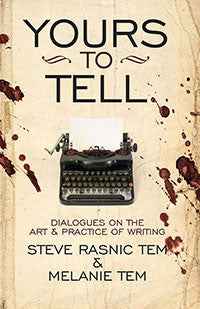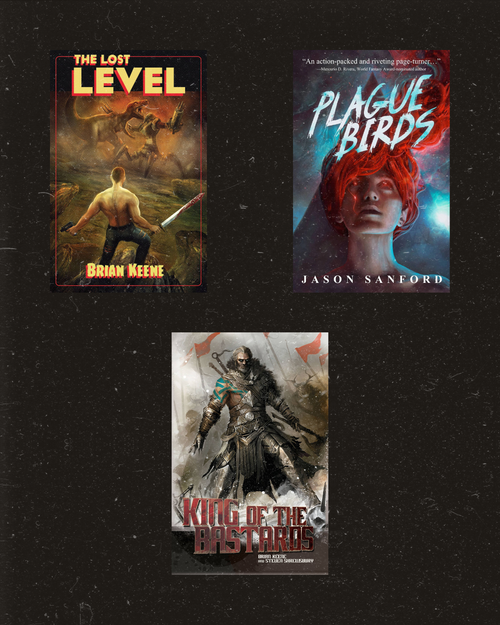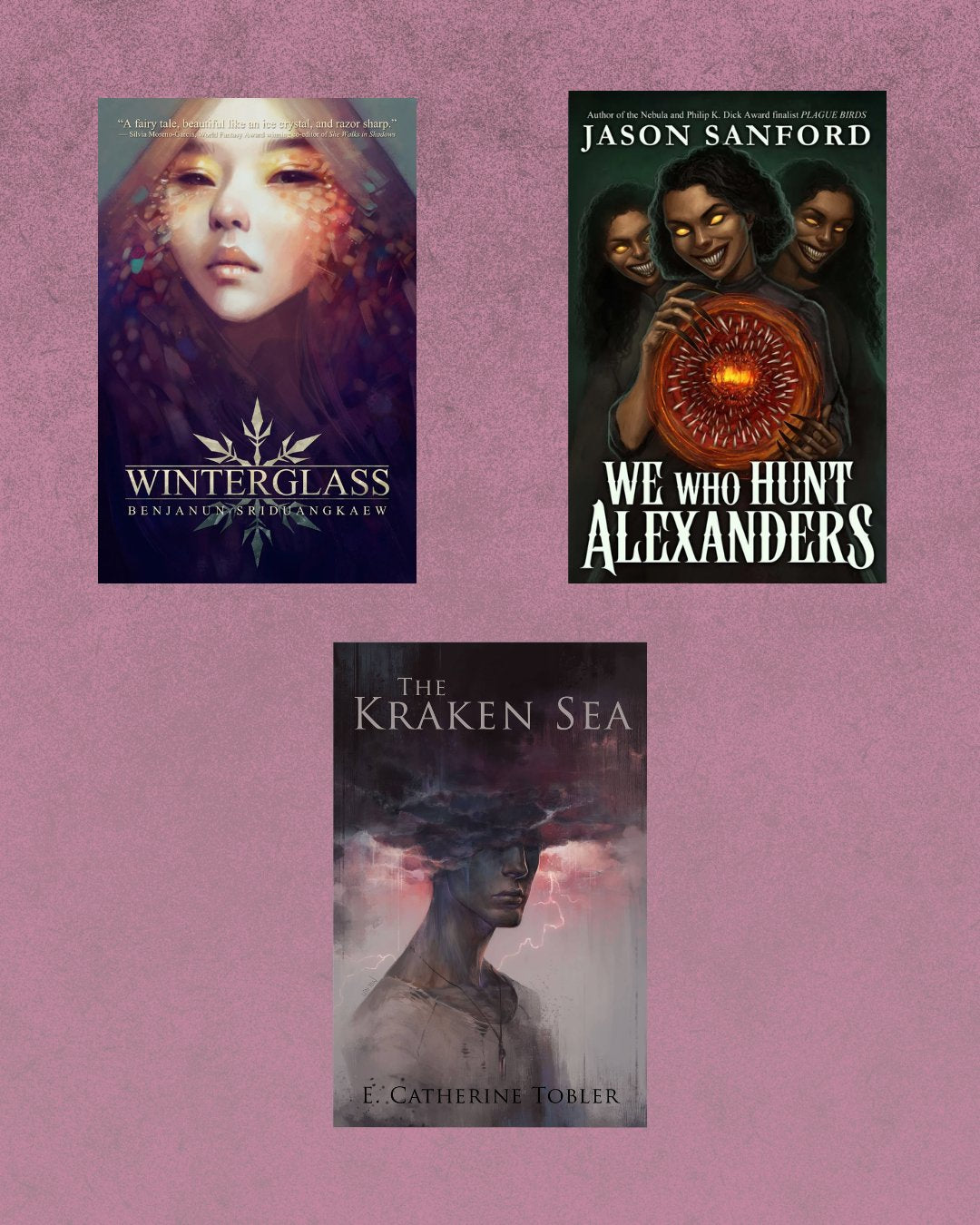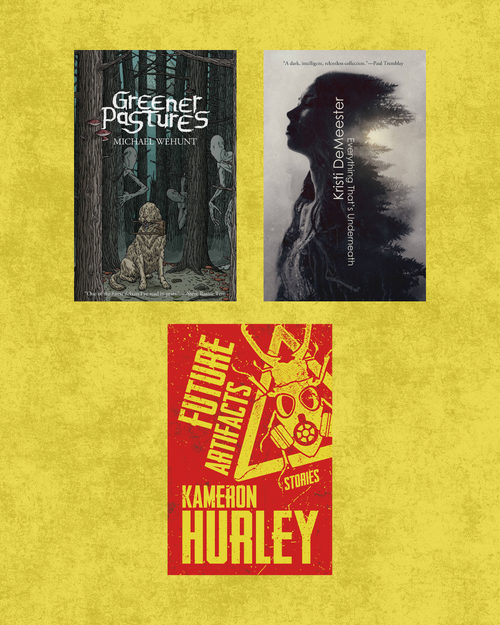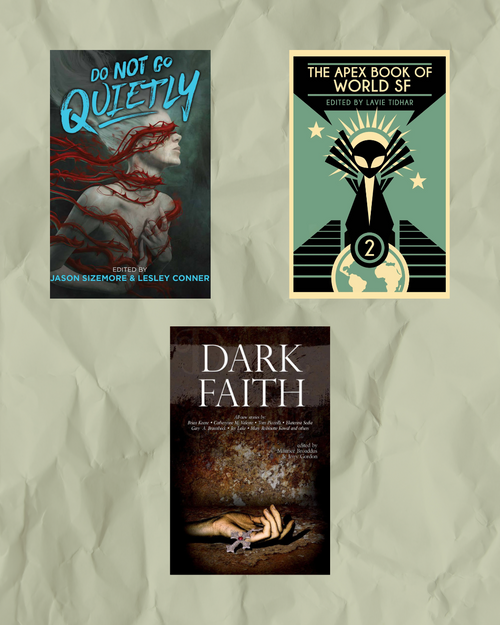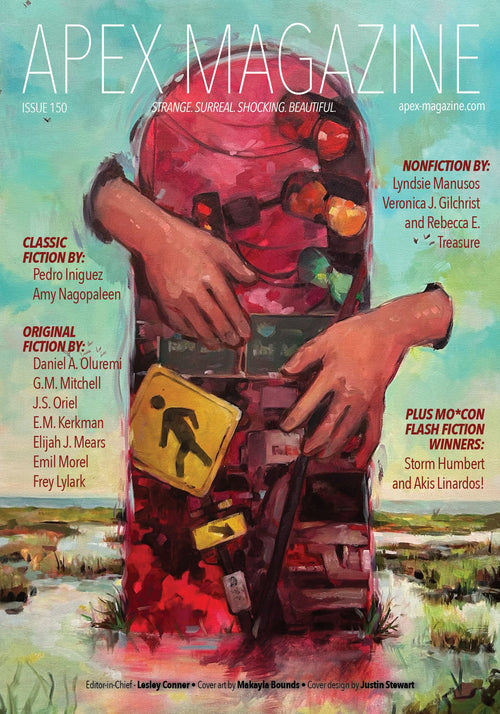Why Write?
by Steve Rasnic Tem & Melanie Tem
The reasons to write are legion, as are the reasons not to:
- The point of writing is to communicate.
- The point of writing is to entertain.
- I write to express myself, whether anybody reads it or not.
- But what if I’m not any good?
- I don’t just want to write. I want to be published, and I want to make a living at it. I want to be part of the literary conversation of our age. Since some of those things are unlikely, why bother?
- Why would anybody care what I have to say?
- I’ve always wanted to write, but I can’t seem to motivate myself to put my butt in a chair long enough to do it.
- Does the world really need more books?
- Where do you get your ideas?
- I write because I can’t help myself.
- I write because I’m a writer, and I’m a writer because I write (Thank you, Descartes.)
Sometimes it’s hard to resist the clever, facile rejoinder:
- Where do you get your ideas? Out of the air.
- If you want to communicate, try Western Union (or Twitter).
- If you have to ask “why write?” don’t bother, you’re not a writer.
But responses like that are not only unhelpful, they’re also—like many another sound bite—incomplete and not entirely honest.
So let’s talk about it.
STEVE: Your stories are yours to tell. It doesn’t matter if you’re not yet an accomplished writer. In the beginning it doesn’t even matter if you haven’t yet been able to complete anything. Nobody else can tell your stories. If you want them to be told, it’s up to you to find a way to do so, and to develop the best technique you can in order to tell them well.
Sometimes when the confidence fails, and you worry you’re not quite the writer you want to be or you don’t have exactly the career you want to have—and those moments inevitably occur, even for experienced writers—that’s something to hold on to: If you don’t write those stories, nobody else will. Oh, they might write fiction that’s thematically similar or has comparable goals, plots, or characters, but they’re still not the same stories you might tell.
MELANIE: If you don’t tell your stories, they’re not going to exist in the world. Told by anyone else, they’re different stories.
STEVE: Fundamentally, it’s about the relationship between you and your stories, about internal rather than external validation, about developing a process of telling. Submitting them, getting them published, having people respond to them—that all happens later, if at all. Too often I run into people so concerned about what happens later they never develop a solid creative process. They never learn how to engage their imaginations so that they can create original and interesting work. Instead of starting to have a conversation with their imagination which results in an original outcome, they’re busy moving words and characters around like game pieces hoping to find a result that will sell.
This isn’t to deny the external aspects of the whole enterprise. But whether you can be a professional writer or not is a separate issue from whether you should write or not. When people read a story in a magazine they don’t care how it got there. I would argue that the process of engaging the imagination, creating characters capable of telling you things you didn’t know, retrieving unconscious bits and making them conscious, and organizing all that into an original vision, has personal benefits that go beyond the assembly of stories for professional publication. I know for me personally, writing has always been a form of meditation. It’s a creative act of empathy. It gets me beyond my own concerns and points me toward the lives and personalities of others. And if you’re going to be a professional writer, close attention to developing your own creative process will make you a better one.
MELANIE: Cyclical changes in the marketplace, affecting sales in the arts as drastically as sales of autos or homes, put a certain spin on the ubiquitous questions about why we write. In better economic times, convention panels and blogs can debate somewhat theoretically the artistic vs. marketing, self-expression vs. communication, “I-write-because-I-have-to” vs. “I-write-because-it’s-fun” vs. “I-write-to-make-money” positions. Most of the time I find them all bogus and irrelevant. I write because I write, and that’s enough for me.
But publishing imprints fold or are cut back, editors move, and it’s not unusual for so-called “mid-list” writers to be without a traditional book contract for years. Writers deal with that problem in different ways. If they make their living as a writer they have to replace that income somehow, so maybe they switch genres, write more nonfiction, do editing work, ghostwrite other authors in order to make ends meet, or go the “indie” route and publish themselves.
If they don’t depend on their writing income for a living (which describes most writers), and they’re able to overcome the inevitable emotional hurdles that arise when you’re dropped by a publisher, these writers have the luxury of simply writing what they want to write, sometimes stockpiling manuscripts until there are better publishing opportunities, or they submit to a small press, or they self-publish with varying expectations as to how much money they’re going to make.
Some writers even use this as an excuse to work on more ambitious projects, or “harder sells,” developing their craft to a higher degree.
STEVE: I think new writers have to consider their choices carefully, perhaps more so now than ever before. With print-on-demand and other new technologies it’s much easier to publish yourself, so the temptation to do so is always there. No waiting to find an agent to represent you. No long submission process to find an interested publisher. But you can short-change yourself by going to a small publisher too quickly or publishing yourself too soon. You’ll be published, but it may take you longer to develop a “name” and reputation as a result.
MELANIE: The current climate doesn’t exactly encourage patience. Newer writers aren’t waiting as long to publish their first collections, for example.
STEVE: Very true. By the time I put together my first collection, City Fishing, I had published 200 short stories. So I had all those stories to choose from. It made it a much stronger collection.
Or maybe you already have the business and PR skills necessary to make real money at self-publication, and building your name value isn’t a real concern for you. That’s for you to decide.
And if you’ve already had some success as a writer you may look at this differently. Perhaps your evaluation of the marketplace tells you your new book has little chance of making it commercially, but it’s a good book, and you want it out there, so you decide to find the right small press for it or publish it yourself.
Or maybe you feel comfortable waiting. If you have any literary ambition, now’s the time to apply it. If you know you won’t be able to sell your next novel to a major house immediately, whatever novel you write, why not take the time to make it something really special, something that stretches the limits of what you thought you could do? The door that opens when all others close is sometimes the path to genius. If some ancient Chinese philosopher (or writer of fortune cookies) didn’t say that, one of them should have.
MELANIE: If one is truly a writer, the challenge sometimes becomes how and why to keep writing when the opportunities for real income and professional gratification become more difficult to find. This makes real and personal the question of why we write. We no longer have the luxury of philosophical musing. We have to face down the uncertainty every time a story idea makes itself known—is it going to sell, and is it going to sell for enough that this profession still makes sense?
What’s the point?
Why do I do this?
If a story blooms in the forest and there’s no one to read it, is there any value?
I have an email you sent me when I was having a particularly difficult time with all this.
STEVE: I think I was having a similarly difficult time—that’s one reason I sent it to you.
MELANIE: Here’s part of what it says—
“I used to have this brief quote from Yeats on my wall: ‘Be secret and exult.’ It’s about taking joy in what you do even when it goes unseen. It’s like a form of prayer, I think. And I’ve always thought of writing as a form of prayer.
“Discouragement is the occupational hazard of writers. New writers are discouraged because they aren’t getting published. Midlist writers are discouraged because they aren’t getting published enough, aren’t famous enough, and have to keep jumping publishers (sometimes to smaller and smaller houses) in order to keep getting published, with a result of longer and longer lag between books. And some well-published writers, the ones who are deeply serious about their craft, are sometimes discouraged when they feel they can’t get their “from the heart” books published—just their slicker, more commercial pieces. I’ve heard many writers talk about trying to make the most of their current success because they know, with the exception of a few highly commercial authors, publishing careers tend to be cyclical, and one day their cycle will end.
“I feel a certain degree of discouragement much of the time, trying to keep it compartmentalized so it doesn’t grow into something that might stop me from writing.”
STEVE: Actually I was just repeating a lot of stuff wiser writers have said to me. Writers write. Put aside for a moment whether they do it because they love it or because they are compelled to do it even if they don’t necessarily love it, whether they demand a professional rate or consider themselves “passionate amateurs.” No matter. Writers write. It’s what they do.
I write. For me to be satisfied, though, it’s always been crucial for there to be an audience at the other end to receive what I have written.
MELANIE: I’m not sure “satisfied” is the right word. Neither of us is ever entirely satisfied with anything about the writing—its quality, its reception. At least, we’re not satisfied for long. Maybe if we won the Pulitzer. Probably not, though.
STEVE: If I won the Pulitzer I’d probably convince myself it was for something I could have made much better. Or it was a clerical error. Steve Flem, that “infamous chronicler of raw physical experience”—he was the one who got the Pulitzer that year, not me.
I want to have the largest audience possible for the kind of story I want to write. That last point is key. Perhaps I could write a different kind of story whose potential audience would be much larger (although I think many writers are unable to make that kind of fundamental change in direction), but what would be the point? If you’re not writing your kind of story you might as well be doing something else for a living as far as I’m concerned. Elevator installers and repairers, for example, make far more than most writers.
MELANIE: What does “your kind of story” mean? Are you saying if someone writes horror, for instance, she or he should never try to write science fiction or mystery or mainstream?
STEVE: Genre can be part of it (although certainly not in my case), but I think it’s more complicated. It has a lot to do with what you value in life, the kinds of characters you’re truly interested in, and the kinds of endings you believe in, whether you want to explore language in your story or just want to use the simplest language that will do the job. Those choices can both define your art and minimize or maximize your potential audience.
For most of us, there are better ways to make money than writing fiction.
MELANIE: Quite possibly, installing elevators.
STEVE: But writers write, and part of the process is finding some way to get their words out there. As you mentioned earlier, if your novels don’t sell, you write short stories or plays. If opportunities in your chosen genre dry up, then maybe you go to a different genre. You try to find your voice within a different context. Genres are cyclical, as are careers. A writer might try essays for a while, or blogging, or non-fiction books. Or edit anthologies until the opportunities change. I started out as a poet, exploring the same ideas and realities I now explore in my fiction.
MELANIE: And I started out writing literary stories only. My first publications were in literary magazines, and I really didn’t think there was any other kind of literature.
STEVE: Justin Cronin was primarily known as a literary writer until he produced the vampire epic The Passage. Scott Spencer is a well-known writer of mainstream thrillers who came out with the horror novel Breed. Romance writers Sandra Brown and Kay Hooper have gone to mainstream women’s fiction. Clive Barker started out writing short horror fiction but his novels have gradually shifted to elaborate fantasies. Joe Lansdale at first wrote horror and westerns but is now primarily known for his crime series featuring Hap and Leonard. Charlie Grant, who started out in science fiction, discovered he felt more comfortable in the horror genre. The examples are endless. Sometimes you go where the money is, and sometimes you switch modes because you find something more in keeping with your personal vision or aesthetic.
Sometimes you don’t know if something else speaks to you until you actually try it. You and I have both had some success with stage plays. I’ve had a couple of short plays produced locally, and you’ve had some longer plays produced here and in other parts of the country.
MELANIE: I also worked with a local indie filmmaker to adapt one of my stage plays for the screen. In the end, he couldn’t raise the money, but the process was fun and I learned a lot. And I’ve done some “telling” at local venues and a regional storytelling festival, which is quite a step for me. Working in new forms is exciting, and a stretch that I find I need creatively.
At my desk early in the morning when the work is going well, or when it isn’t and I’m pulling out all the stops to find the right way to tell the story, I don’t think about whether anybody will read what I’ve written. But when I’m going about the rest of my life, during the slower periods I sometimes find myself wondering if I’m being foolish to keep writing when things aren’t selling as well as I’d like, or whether it’s actually a measure of artistic integrity to keep on.
Not that, really, I have much of a choice. Writers, as someone said, write.
STEVE: You never really know if your inability to sell new projects is simply the result of another cycle in publishing. What if it’s the beginning of something larger? Massive media changes are occurring more quickly than they used to. I expect to see the end of the daily print newspaper within the next twenty years. I also expect to see all of our beloved commercial print fiction magazines replaced by online versions within the next two decades. That’s not a change I welcome, but it’s one I feel requires some adjustments in attitude on my part. I expect the life of printed short fiction—whose length makes it more palatable online and whose economics are even shakier than those of longer works—will be shorter than the life of the printed novel.
For younger writers I think this is less of an emotional issue. But for writers who grew up developing their skills with book and magazine publication in mind, it represents a serious shift in expectations. You develop that hunger for being in those brightly-colored magazines or in those hardbound books on the library shelves. It’s a taste hard to surrender.
MELANIE: We were originally both resistant to the possibilities of e-publishing. For me, that comes from my less-than-impressive expertise with the medium.
STEVE: Even though my day job has been in the software field for several decades and I find much about the information age exciting and interesting, it’s been hard for me to make the transition to non-physical publication. I would miss the feel of a book, the smell of the paper, the visceral pleasure of sitting in a comfy chair to read.
MELANIE: Partly because of my limited vision, no doubt, I’ve never been as attached to the book-as-object. Being read to was a big part of my childhood, and brings back an almost primal sense of the wonders of words, how much there is to learn in the world. So I’m a big fan of audio books, which have a quite different presence than print.
STEVE: I don’t get quite the same thrill from having my work online that I do from print publication. On the other hand, it is gratifying to have access to that audience.
MELANIE: To me it’s pretty silly to bemoan change, even seismic change like this. No doubt people also predicted the end of civilization when the written word edged out the spoken word, and there are plenty of folks nowadays who work to keep the oral tradition alive. Probably there were cadres of purists for whom mechanically-printed books were less “real” than illuminated manuscripts. I do feel a certain unease about the changes we seem to be at the edge of. But I also find it exciting to wonder what it will all bring.
STEVE: I agree—in the long run, it’s fruitless to bemoan change, especially because you don’t yet have that panoramic view that tells you the overall balance of loss and benefit.
On the other hand, I think sometimes it’s important to say, “No, I’m not going to let all this go away,” and make some attempt to preserve the things we value. For a time supernatural tales largely went away from commercial venues, but enthusiastic writers and people running small journals kept the flame alive. I expect the same to happen again with certain kinds of print media.
And of course, predicting the course of cultural change is hardly a science. There are numerous signs that the eBook market is stabilizing, and may not reach the high percentages some had predicted, at least not yet.
Things are always changing in our culture, and you can’t always predict the nature or speed of those changes, or even if we’re going to like them after everything has played out. Sometimes I think we put too much energy into worrying over the specifics. Writers write, whether they’re making money at it or not, whether it’s online or not, whether they’re even publishing or not. For many it’s been a long time since they made enough money. I think fiction adds a great deal of value to the culture, whether its value is appreciated with money or not.
I think short fiction, a form some say professional writers shouldn’t even bother with, is of particular value. And maybe at the end I’ll be scribbling these bizarre little fables which will only be found tucked away on some small isolated website in some obscure corner of the internet, and I’ll have no idea as to the size or the nature of my audience. But scribble I will.
I do believe the things you write are your economic resources and you need to use them wisely, and get the best deals for them. But I also think using your resources wisely sometimes means publishing with a small publisher with a good reputation because they can do a good job for you, or because you want to be part of a particular literary conversation with other writers.
Writing is a business, but it can be an extremely dysfunctional business, sometimes to the point of absurdity.
MELANIE: But, writers write.
This dialogue originally appeared in Yours to Tell: Dialogues on the Art & Practice of Writing (Apex Book Company)
Steve Rasnic Tem and Melanie Tem have been writers, both solo and in collaboration, for over thirty-five years. Between them they have published over 600 short stories, 20 novels, 10 short story collections, and numerous articles, essays, poems, and plays. They are past winners of the World Fantasy Award, British Fantasy Award, and the Bram Stoker Award.








